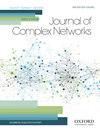Social relationships in children: favourable influence of activities promoting self-awareness and empathic interaction
IF 1.5
4区 数学
Q2 MATHEMATICS, INTERDISCIPLINARY APPLICATIONS
引用次数: 2
Abstract
Embodied and intersubjective experience is crucial to the social cognition processes on which interpersonal relationships are based. We assessed whether promoting these processes through participation in self-awareness and empathic interaction activities can influence social integration among peers in 7- to 8-year-old children. The intervention, conducted in a school context, included mindfulness-based practices (favouring self-awareness), empathic collaboration activities and perspective-taking instances (promoting other-oriented awareness). To evaluate social integration levels, children were asked to complete a sociometric questionnaire, each listing the peers they would choose to play with (positive ties) and those they would prefer not to play with (negative ties). Based on this relational data, two types of directed networks were constructed: positive networks (PN) and negative networks (NN), in two temporal instances (pre- and post-intervention). In both the experimental and waitlist groups, pre–post intervention changes in the topology of peer social networks were evaluated by analysing global network properties such as connectivity, degree distribution, density, reciprocity, transitivity and modular structure. Our findings showed that after participating in the intervention social integration was improved, reflected in increased general interconnection of positive ties: greater average connectivity and density in PN, more equitably distributed choices (no evident leadership), greater cohesion and an increase in the number of reciprocal interactions. Additionally, we found a lower level of social rejection; that is, lower average connectivity and density in NN, the persistence of only mutual negative choices and negative ties confined to small groups. These findings were not observed in the waitlist group. This study demonstrates how participation in an intervention that promotes social cognition processes can influence the structure of peer social networks, favouring social integration. The social network analysis provides quantitative evidence of the plasticity of social relationships in children, constituting a valuable tool for the assessment of this kind of intervention at a group level.儿童的社会关系:促进自我意识和共情互动的活动的有利影响
具体化和主体间体验对人际关系所基于的社会认知过程至关重要。我们评估了通过参与自我意识和移情互动活动来促进这些过程是否会影响7至8岁儿童同龄人的社会融合。干预措施是在学校背景下进行的,包括基于正念的实践(有利于自我意识)、移情合作活动和视角分析(促进其他导向的意识)。为了评估社会融合水平,孩子们被要求完成一份社会测量问卷,每个问卷都列出了他们会选择与之一起玩的同龄人(积极关系)和他们不愿意与之一起玩耍的同龄人(消极关系)。基于这些关系数据,在两个时间实例(干预前和干预后)中构建了两种类型的有向网络:正网络(PN)和负网络(NN)。在实验组和候补组中,通过分析全局网络特性,如连通性、程度分布、密度、互易性、传递性和模块化结构,评估了干预前后对等社交网络拓扑结构的变化。我们的研究结果表明,在参与干预后,社会融合得到了改善,这反映在积极联系的总体互连增加上:PN的平均连通性和密度更大,选择分布更公平(没有明显的领导力),凝聚力更强,互惠互动次数增加。此外,我们发现社会排斥程度较低;也就是说,NN中的平均连通性和密度较低,只有相互负选择和负联系的持久性局限于小群体。在等待名单组中没有观察到这些发现。这项研究表明,参与促进社会认知过程的干预可以影响同伴社会网络的结构,有利于社会融合。社会网络分析为儿童社会关系的可塑性提供了定量证据,为在群体层面评估这种干预提供了宝贵的工具。
本文章由计算机程序翻译,如有差异,请以英文原文为准。
求助全文
约1分钟内获得全文
求助全文
来源期刊

Journal of complex networks
MATHEMATICS, INTERDISCIPLINARY APPLICATIONS-
CiteScore
4.20
自引率
9.50%
发文量
40
期刊介绍:
Journal of Complex Networks publishes original articles and reviews with a significant contribution to the analysis and understanding of complex networks and its applications in diverse fields. Complex networks are loosely defined as networks with nontrivial topology and dynamics, which appear as the skeletons of complex systems in the real-world. The journal covers everything from the basic mathematical, physical and computational principles needed for studying complex networks to their applications leading to predictive models in molecular, biological, ecological, informational, engineering, social, technological and other systems. It includes, but is not limited to, the following topics: - Mathematical and numerical analysis of networks - Network theory and computer sciences - Structural analysis of networks - Dynamics on networks - Physical models on networks - Networks and epidemiology - Social, socio-economic and political networks - Ecological networks - Technological and infrastructural networks - Brain and tissue networks - Biological and molecular networks - Spatial networks - Techno-social networks i.e. online social networks, social networking sites, social media - Other applications of networks - Evolving networks - Multilayer networks - Game theory on networks - Biomedicine related networks - Animal social networks - Climate networks - Cognitive, language and informational network
 求助内容:
求助内容: 应助结果提醒方式:
应助结果提醒方式:


